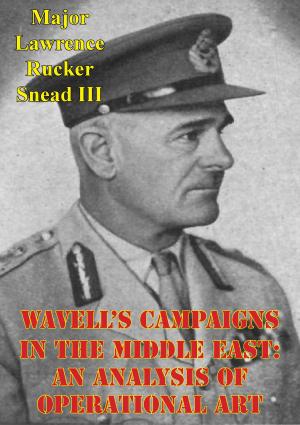TO BIZERTE WITH THE II CORPS - 23 April - 13 May 1943 [Illustrated Edition]
Nonfiction, History, Germany, European General, Military, United States| Author: | Anon | ISBN: | 9781782894582 |
| Publisher: | Lucknow Books | Publication: | August 15, 2014 |
| Imprint: | Lucknow Books | Language: | English |
| Author: | Anon |
| ISBN: | 9781782894582 |
| Publisher: | Lucknow Books |
| Publication: | August 15, 2014 |
| Imprint: | Lucknow Books |
| Language: | English |
With 18 maps & 24 Illustrations.
A DELEGATION OF GERMAN OFFICERS arrived at American Headquarters south of Ferryville at 0926 on 9 May 1943. Their mission was to surrender the remnants of a once proud unit of the Wehrmacht, the formidable Fifth Panzer Army...Marshal Giovanni Messe, commanding the Italian First Army, surrendered unconditionally to the British Eighth Army on 13 May. The long battle for North Africa was ended.
Troops of the II Corps, U. S. A., who had entered the fight for Africa with the invasion on 8 Nov. 1942, played a prominent role in the decisive final battle which opened on 23 April...Within 2 weeks of the Nov. landings in Northwest Africa, British and American forces under General Dwight D. Eisenhower were driving from Algeria into western Tunisia in an effort to seize the great ports of Tunis and Bizerte. German reinforcements, rushed into Africa in the nick of time, stopped the advance just short of the Tunis plain. With operations now made difficult by the rainy winter season, the Allied Army fought bitter engagements in the mountains from Sedjenane Station to Medjez el Bab. To the south, American units in hard fighting stopped savage German drives through Kasserine Pass toward the Allied base at Tebessa and kept pressure on the long Axis communications between Field Marshal Rommel and Tunis.
In late March, Rommel’s forces were driven from the Mareth Line toward the north. Protecting his line of retreat, the enemy fought a stubborn delaying action against the Americans and the British in the El Guettar-Gafsa area. By 22 April the equivalent of 5 Italian and 9 German divisions were at bay for what they planned to be a protracted defense of Tunis and Bizerte. But the Axis was not allowed a breathing space to strengthen its defenses. The Allied forces, united under General Sir Harold R. Alexander as the Eighteenth Army Group, were already preparing the blow that was to destroy the enemy forces in a battle lasting 21 days.
With 18 maps & 24 Illustrations.
A DELEGATION OF GERMAN OFFICERS arrived at American Headquarters south of Ferryville at 0926 on 9 May 1943. Their mission was to surrender the remnants of a once proud unit of the Wehrmacht, the formidable Fifth Panzer Army...Marshal Giovanni Messe, commanding the Italian First Army, surrendered unconditionally to the British Eighth Army on 13 May. The long battle for North Africa was ended.
Troops of the II Corps, U. S. A., who had entered the fight for Africa with the invasion on 8 Nov. 1942, played a prominent role in the decisive final battle which opened on 23 April...Within 2 weeks of the Nov. landings in Northwest Africa, British and American forces under General Dwight D. Eisenhower were driving from Algeria into western Tunisia in an effort to seize the great ports of Tunis and Bizerte. German reinforcements, rushed into Africa in the nick of time, stopped the advance just short of the Tunis plain. With operations now made difficult by the rainy winter season, the Allied Army fought bitter engagements in the mountains from Sedjenane Station to Medjez el Bab. To the south, American units in hard fighting stopped savage German drives through Kasserine Pass toward the Allied base at Tebessa and kept pressure on the long Axis communications between Field Marshal Rommel and Tunis.
In late March, Rommel’s forces were driven from the Mareth Line toward the north. Protecting his line of retreat, the enemy fought a stubborn delaying action against the Americans and the British in the El Guettar-Gafsa area. By 22 April the equivalent of 5 Italian and 9 German divisions were at bay for what they planned to be a protracted defense of Tunis and Bizerte. But the Axis was not allowed a breathing space to strengthen its defenses. The Allied forces, united under General Sir Harold R. Alexander as the Eighteenth Army Group, were already preparing the blow that was to destroy the enemy forces in a battle lasting 21 days.
![Cover of the book TO BIZERTE WITH THE II CORPS - 23 April - 13 May 1943 [Illustrated Edition] by Anon, Lucknow Books](https://www.kuoky.com/images/2014/august/500x500/9781782894582-rGRQ_500x.jpg)



![Cover of the book On The Road To Kut, A Soldier’s Story Of The Mesopotamian Campaign [Illustrated Edition] by Anon](https://www.kuoky.com/images/2014/june/300x300/9781782891758-zjOL_300x.jpg)

![Cover of the book St Vith: Lion In The Way: 106th Infantry Division in World War II [Illustrated Edition] by Anon](https://www.kuoky.com/images/2014/august/300x300/9781782898559-GZaf_300x.jpg)



![Cover of the book A Volunteer Poilu [Illustrated Edition] by Anon](https://www.kuoky.com/images/2014/august/300x300/9781782893110-8OEc_300x.jpg)



![Cover of the book Grand Fleet Days [Illustrated Edition] by Anon](https://www.kuoky.com/images/2015/november/300x300/9781786255358-2SuP_300x.jpg)
